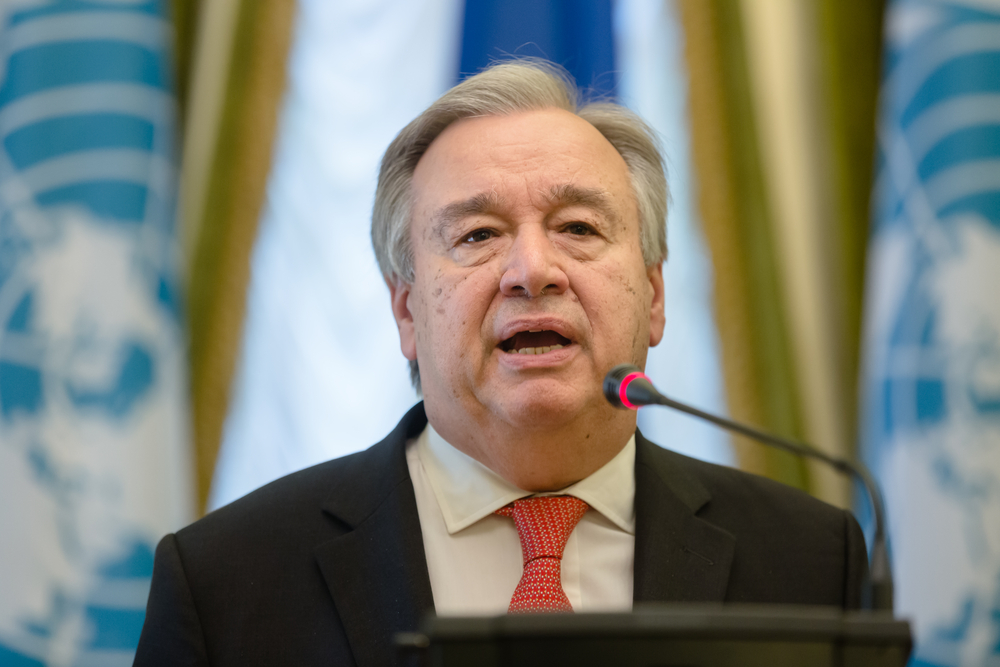News
UN chief: 250 million children in conflict affected nations

Guterres said more than 24,000 violations against children were documented and verified in 2018, up from 21,000 in 2017. (Shutterstock Photo)
CAMEROON, Cameroon — Some 250 million children live in countries affected by conflict, Secretary-General Antonio Guterres told the U.N. Security Council on Wednesday.
And he said 2018 saw more than 12,000 children killed or injured as a result of those conflicts, the highest number since 1996.
Speaking on the International Day against the Use of Child Soldiers, the U.N. chief said children below age 18 “constitute more than 50% of the population of most countries affected by war, and are among the most vulnerable, unable to protect themselves from its impact.”
Guterres said more than 24,000 violations against children were documented and verified in 2018, up from 21,000 in 2017.
He said global campaigns, including “Children, Not Soldiers” and the new “Act to Protect” have helped get out the message that children should never be used in conflict, but the figures continue to rise.
“Greater awareness and better monitoring do not account for this increase,” he said. “It is the result of ongoing and worsening hostilities, and a shameful disregard for civilian lives.”
The secretary-general urged all countries to take “concrete actions” to make the protection of children affected by conflict a priority.
The Security Council approved a presidential statement launching new guidance for mediators that aims to ensure that children’s needs and rights are considered during all phases of conflict — from prevention to mediation, peace negotiations and post-conflict recovery.
The briefing was organized by Belgium, which holds the council presidency this month.
In a rare appearance at the Security Council by a monarch, Belgian King Philippe said he was speaking on an issue that one of his predecessors, King Baudouin, addressed world leaders about 30 years ago when the Convention on the Rights of the Child entered into force.
Philippe said the vulnerability of children has been “an over-arching priority” in Belgium’s foreign policy and a cause his wife, Queen Mathilde, who sat in the council chamber, has championed.
“This is an issue that remains acutely urgent at a time when geopolitical tensions are at their highest level since the beginning of the century,” the king said. “Today, one of five children worldwide endures the adverse repercussions of armed conflict. This cannot leave us unmoved.”
Philippe said the world has a duty to help conflict-affected children recover, thrive, reintegrate into society and get an education — but this requires political will and “human and financial resources.”
Jo Becker, addressing the council on behalf of the Watchlist on Children and Armed Conflict, which is a global network of organizations devoted to protecting and promoting the rights of these children, said that “in reality, peace agreements that address child protection are still rare.”
She said the Watchlist conducted an analysis of cease-fire and peace agreements going back to 1999, and “of 445 documents, fewer than 18% included child protection provisions.”
Children suffer disproportionately more in war, Becker said, and when they are excluded from peace agreements “their needs and rights become invisible,” which results in under-investment and lack of programs to help them.
“In such circumstances, we can’t be surprised if new grievances emerge and former child soldiers take up arms again,” Becker said.
She said there are some good examples: The 1999 peace accord that ended the conflict in Sierra Leone called for particular attention to child soldiers and paved the way for the demobilization of 7,000 children. In Colombia, an agreement by the country’s main rebel movement for releasing children under age 15 helped build trust ahead of the 2016 peace agreement between the group and the government.
Becker urged the Security Council to help ensure that children’s rights and protection are included in all conflict-related agreements.





















